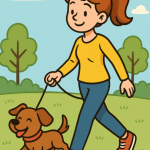
Why Dogs and Chocolate Still Don’t Mix (But Don’t Panic—Here’s What Science Says)
It’s almost Halloween, so let’s take a moment to connect with one of the biggest fears of dog owners.
We’ve all been there: you turn your back for two seconds, and your dog’s face is buried in a box of chocolates like they’ve just won the Wonka lottery. Cue the panic, the late-night Google search, and the emergency vet call.
But a recent study from Berlin’s Freie Universität looked at 156 real cases of dogs eating chocolate between 2015 and 2019—and the results might surprise you. While chocolate is dangerous, the story is a bit more nuanced (and less doom-scroll-inducing) than most pet parents think.
☠️ The Science Behind the Scare
Chocolate contains two sneaky compounds—theobromine and caffeine—known as methylxanthines. These act like supercharged coffee for dogs: speeding up their heart, revving their muscles, and making them restless or shaky.
Here’s the catch: not all chocolate is created equal.
- White chocolate is basically harmless.
- Milk chocolate has some risk.
- Dark and baking chocolate? Those are the heavy hitters, packing up to 25 times more theobromine than milk chocolate.
In the study, dogs started showing symptoms—like agitation, tremors, vomiting, and rapid heartbeat—at doses of around 20 mg of theobromine per kilogram of body weight. That’s roughly a few squares of dark chocolate for a 10-pound pup.
🐶 What Actually Happens When a Dog Eats Chocolate
Out of the 156 dogs studied:
- 112 were totally fine (no symptoms at all).
- 44 got sick, showing signs like trembling, vomiting, or panting.
- 43 of those 44 recovered completely.
- Only one dog didn’t make it—a heartbreaking reminder that even small amounts can be serious depending on the dog and the chocolate.
The vets also found some sciencey stuff that explains those symptoms:
- Almost half had low potassium, which can make muscles weak.
- Others had elevated liver enzymes, probably from all that muscle activity.
- And many were dehydrated or overheated, thanks to chocolate’s caffeine-like effects.
🚨 What You Should Do (and Not Do)
If your dog eats chocolate:
- Stay calm. Most dogs, especially if they ate milk chocolate, will be fine.
- Call your vet—they can estimate the risk based on your dog’s weight and the chocolate type.
- Don’t try home remedies. Vets often use safe methods like inducing vomiting (with apomorphine), giving activated charcoal, and IV fluids to help flush out toxins.
Pro tip: Chocolate toxicity tends to spike around Christmas and Easter, when tasty temptations are everywhere. So keep the holiday candy stash out of paw’s reach.
❤️ The Good News
The study’s takeaway is reassuring: with quick action, the prognosis is excellent. Even dogs who showed scary symptoms bounced back after prompt vet care.
So while chocolate is never a good idea for dogs, it’s not an automatic tragedy either. The key is speed—getting them checked out before those compounds have time to fully absorb.
🐾 Share Your Pet’s Story!
Has your dog ever pulled a chocolate heist? What happened next? Tell us in the comments below—or share a pic of your guilty-looking pup with the hashtag #SweetButSafe.
Want more science-backed pet health tips? Subscribe to This Week in Pet Health for weekly stories that make pet science fun, practical, and impossible not to share.




